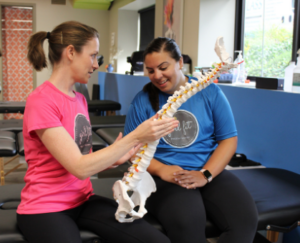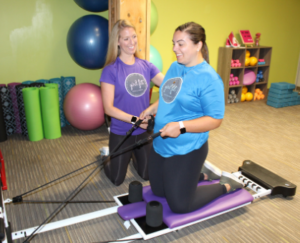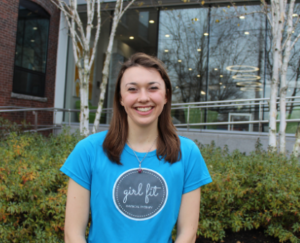

Physical therapists spend a lot of time talking to their patients. In fact, patients spend more time talking with PTs than any other health care provider. Because we spend so much time talking, it is important to examine the impact of that time and the words used in our clinic.

Words create an emotional response, some words creating a positive and some creating a negative reaction in the body. In a study of commonly used words in hand-surgery, certain words like pain, rupture, and degenerative, created a more negative response in patients than alternative words.(1) Below are some examples of things you may have heard from medical professionals and alternatives that can create a more positive emotional response.
| Traditional Language | Alternatives |
| Pain | Discomfort, ache |
| Instability | Needs more strength and control |
| “You are going to have to live with this” | “You may need to make some adjustments” |
Confusing medical terminology can also create negative connotations, as shown by a study of back pain terminology. This study states “The [non-medically trained] participants generally did not feel that health professionals adequately explained terms and back pain in an understandable way.” (2)
What can those emotional responses to words influence? Research indicates that these emotional responses affect many aspects of your care! Rewording MRI reports can increase your ability to understand and use the information. (3) Changing the verbal and non-verbal language used by healthcare professionals improves patient outcomes. (4,5) One study found that “Physical therapists who smile, nod, and maintain eye contact compared with those who do not smile or look away from the patient, have been shown to achieve greater short- and long-term improvements in functioning of their patients.” (5) This all means that when you and your healthcare provider, including your physical therapist, communicate clearly and effectively, you get better faster.

Another way that language can have a real impact on people’s lives is in the space of LGBTQ+ inclusivity. Our therapist, Madeleine, spent time as a PT student researching and working on creating a better environment for PT patients who identify as gender or sexual minorities. She began by focusing on education of the physical therapy faculty at Northeastern University. One important message she shares is that using someone’s correct names and pronouns can reduce depression symptoms of 71%, thoughts of suicide by 34%, and attempted suicides by 65%. (6) So, if someone tells you their name or the pronouns they use (she, he, they, etc.) make every effort to use them properly and correct yourself if you make a mistake! This is so important because an action as simple as changing your words can actually save the lives of those around you.
Words can have a big impact on the people around you, yourself, and your care as a physical therapy patient. We strive to always use positive language and create a supportive, healing environment at Girl Fit Physical Therapy. And we hope that you remember to use positive language when talking to yourself as well. Language affects your life whether it is from your physical therapist, your friend, or yourself.
Madeleine Hines, PT, DPT

To schedule a physical therapy appointment or Wellness Visit with Madeleine or another of our caring physical therapists, email us at office@girlfitrocks.com. We continue to offer both in person and Telehealth visits. To learn about our COVID safety measures, check out our recent blog post “Maintaining a Safe Environment for Girl Fit Patients and Staff”.
References:

